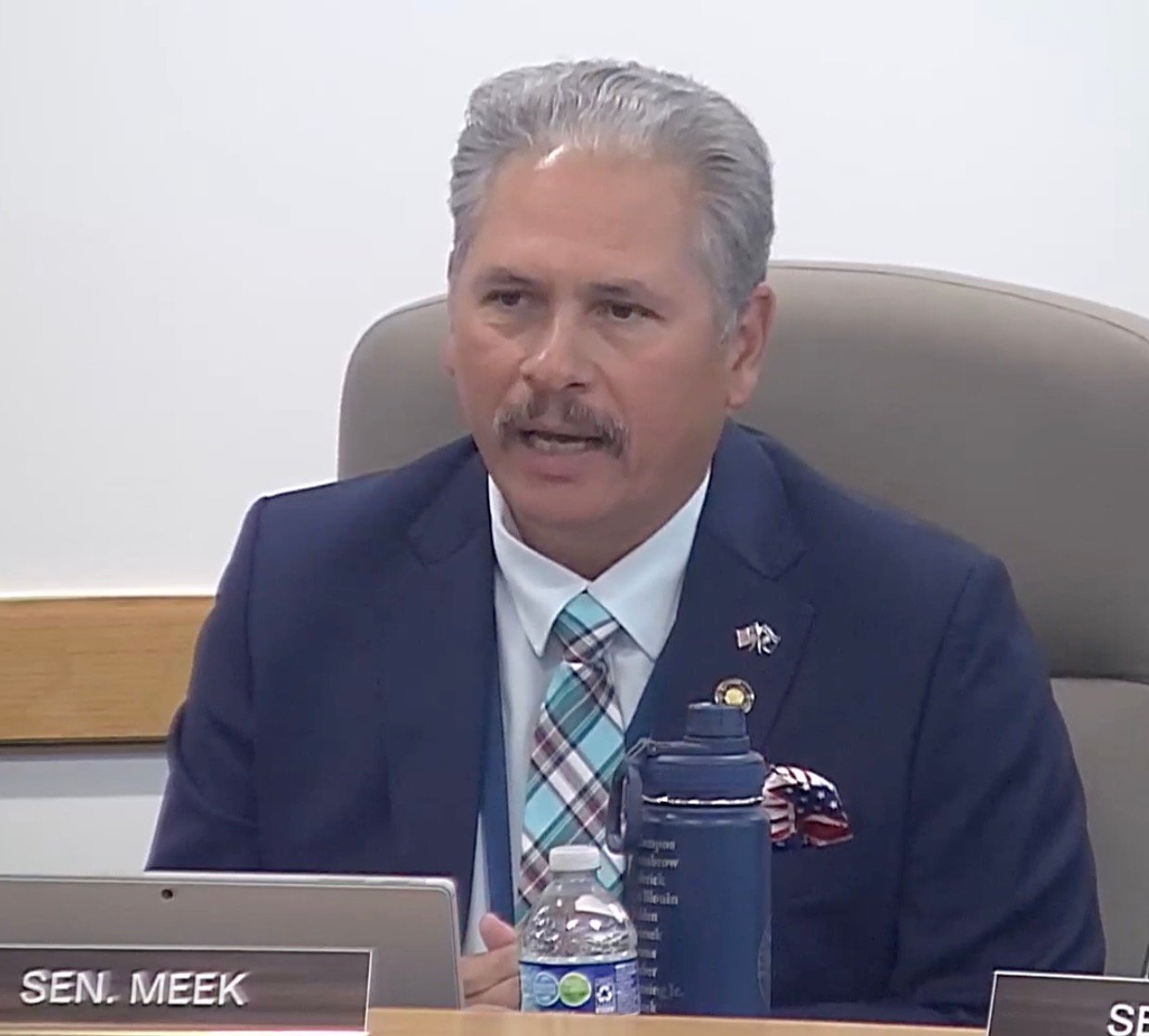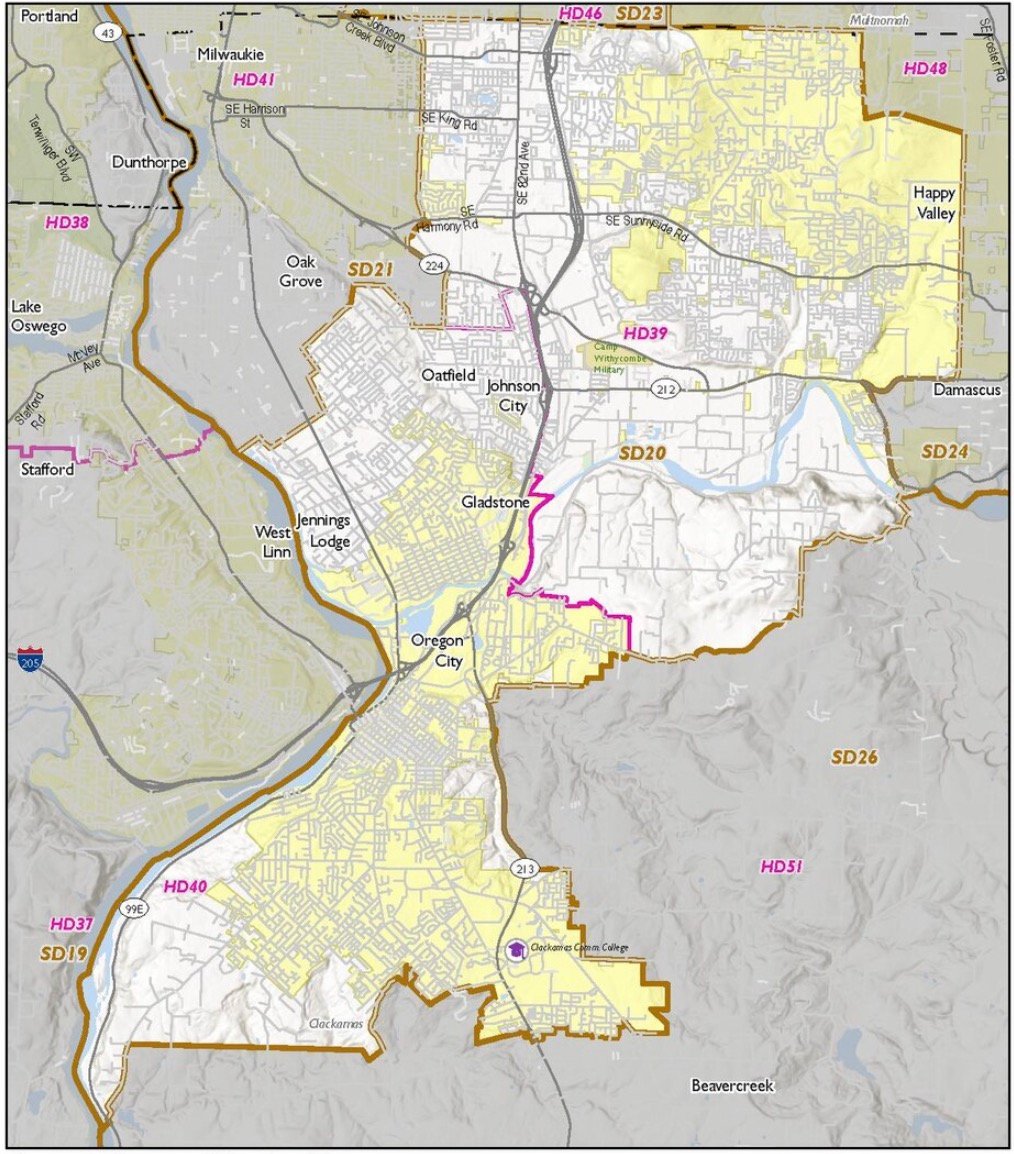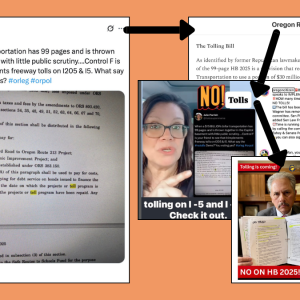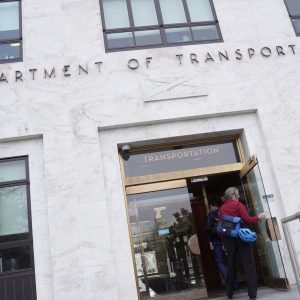
Many members of the Oregon Republican party are thrilled that transportation funding legislation did not pass this session. And while they take credit for it, the reason a bill didn’t pass was because of Democrats.
Or to be more precise, a Democrat. One named Mark Meek, a senator who represents District 20 which includes parts of east Portland, Happy Valley, Oregon City and Gladstone.
Meek’s opposition to House Bill 2025 sealed its fate. The former pub owner and now real estate agent accrued a superpower this session by being the vote that decided whether or not Democrats held onto their supermajority. The party needed all 18 of their members in the 30-person Senate to pass the bill. When Senate President Rob Wagner couldn’t get one other Republican “yes” to offset Meek’s “no,” the game was over.
So why was Meek so opposed to the bill? I can’t get into his head and I haven’t talked to him directly, but I have tracked down several recent comments about the bill made in committee which help shed light on his perspective.
Before I get into this, it’s worth noting that Meek comes from a very purple district that was held by a Republican for 12 years before he won the seat. It’s almost split in half by Democrats and Republicans. In 2022, even after the district was redrawn for a stronger Democratic advantage, Meek eked out a victory by garnering 50.4% of the vote compared to his challenger’s 49.6% — a difference of just 503 votes out of 62,131 votes cast.
So when it comes to issues like taxes and transportation, you can see why Meek needs to play it very safe.
That didn’t stop him from supporting the bill when it first came to the Joint Committee on Transportation Reinvestment (JCTR) on June 9th.
Meek, then a member of the committee, opened his remarks by thanking Senator Bruce Starr, a Republican, for his work on the bill. (Despite Republican claims that the process was not bipartisan; Starr, Boshart Davis, and other members of the Republican party were at the table as Democrats tried to include their ideas into a final package.)
“I will vote and support the introduction of this bill,” Meek said to his fellow committee members. But his support was conditioned on, “knowing a lot of work has to be done.”
Already June 9th, it was just 20 days before the end of session and while Meek acknowledged it was a “short period of time,” he felt the bill was important enough to get done.
Meek’s concern about the rushed timeframe and the delay in getting the bill out was shared widely among lawmakers and advocates from across the political spectrum and will go down in history as one of the primary errors of Democratic party leadership. Over two months passed from when Democrats first revealed an official funding framework in April to when HB 2025 became public around June 9th. In that interim period, impatience grew so much that members of the Democrat and Republican parties bothunveiled bills of their own (that would later become amendments to the official bill).
Getting back to Meek, he was sanguine about the bill’s prospects on June 9th.
“I would call this the, you know, the foundation, the starting point,” he said at that first committee meeting. “Let’s let’s have some really good conversations, and let’s keep our options open, because I think Oregonians are looking for us to to really pass an appropriate transportation package that will both be responsible, palatable and effective with our transportation system right now, on all levels. I’m just hoping that we all keep an open mind, and we’re all able to really listen to each other and collaborate and come to what I would say is a proper solution for all of us.”
I hope to someday ask Meek what exactly his “proper solution for all of us” would be; but for now let’s see what else he said about it during the session.
One day later, on June 10th, there was another committee hearing on the bill. This was where we get the first hint that Meek might be frustrated at the rushed timeline for the bill. At one point he asked, “How much revenue is this bill generating in general?” To which he was told by someone from the Legislative Fiscal Office that those numbers were still being crunched and would not be available for two more days.
I’m not sure if or how much this answer bothered Meek, but other members of the committee were reasonably annoyed that a bill was having public hearings before basic financial details were worked out.
“I am surprised that we’re not getting any dollar amounts until Thursday, which is after most of the public hearings,” said House Rep and committee Vice-Chair Shelly Boshart Davis that Tuesday. “I think that’s a bit irresponsible for the public to weigh in when we don’t know what kind of revenue is being raised.”
(Dem lawmakers say the reason the number crunching took so long this year is because lawmakers were wrestling with an extremely challenging set of cost tables as part of their revamp of the Highway Cost Allocation Study (HCAS), an annual report that calculates what different types of vehicles pay to use the roads.)
The next we heard from Meek was one week later. By that time, the fiscal analysis had been completed, but lawmakers’ heads were spinning as they tried to keep track of 18 different amendments that had been filed.
In his remarks at the June 17th committee meeting, Meek’s tone had changed. “At the risk of being critical, I’m going to be critical,” is how he kicked off an exchange with JCTR Co-Chair Sen. Chris Gorsek:
Meek:
“I don’t see how anybody can expect us to vote on this tomorrow or the day after based on everything that was presented,” Meek said, “and the time we have to digest this and even to amend it or correct it and make sure it is accomplishing what we are looking at.
I am frustrated to the highest level, and you can expect a no vote out of me right now.”
Gorsek:
“You know that in times like this, there are going to be problems getting information from LRO [Legislative Revenue Office] and LFO [Legislative Fiscal Office]. This is not an unusual circumstance, and things are still coming together. That’s not our choice, but it is what’s been happening, and so we’ve been delayed, and we have presented what we have at the present time. But I hope you won’t rush to judgment on this and that you will give it a chance, because there’s still a lot more information to come out.”
Meek:
“Co-Chair Gorsek, can you understand the exercise that we’re going through? We’re scheduled for an informational meeting on this and we barely get it an hour ago or so. We are all very busy at this time. And then we look for numbers. We’re supposed to be digesting numbers. We asked for numbers last week. We finally got them on Thursday or early Friday.
Co-Chairs Gorsek and McLain, I don’t I don’t blame you, but we started this exercise June 9th, and trying to rush this not a good practice.”
Gorsek:
“And let me say I totally understand what you’re saying. We too have been very frustrated with how slow the information has been coming to us and and I don’t blame you a bit for being frustrated. We’re frustrated as well, but I hear what you’re saying.”
Three days after this exchange where Meek expressed his intent to vote against the bill, he was removed from the committee.
On June 20th, Meek was seated on the dais of the committee as a non-voting member and he got one last chance to speak his mind.
Meek stated that his opposition was to the process, which he felt was rushed. When he began to share a personal experience to flesh this out, I perked up. He then spent several minutes recounting a story about being a small business owner in the 1990s and how he tried to redevelop a theater in southeast Portland into a tavern venue called the Mt. Tabor Pub.
“It took me months to go through the process,” Meek recalled. He explained how he had to get buy-in from neighborhood associations, then get city permits, and deal with the Oregon Liquor Control Commission (OLCC) to get a new license. Through it all, he encountered obstacles. “They wanted me to put in a fire suppression system. I didn’t have money for a fire suppression system, so I figured out a way to navigate and overcome that issue… Then I had trouble running my coolers… and I had to get a rotor hammer and cut four-inch concrete in half to get the glycol system to operate and provide beer down to the servers,” he continued.
It was “hurdle after hurdle after hurdle” and “misstep after misstep after misstep,” Meek shared. But he persevered. “I got it opened, only to be a failed business,” Meek said.
The relevance of this comparison was somewhat lost on me, but Meek said he’s seen a similar “misstep after misstep” with how the process behind HB 2025 had gone.
“The [bill] language is incorrect; we’re attending to technical fixes; we have information coming to us late; our committee was scheduled for 2:30 and we start until 4:00 or so,” Meek said, listing some of his frustrations.
And then we got to the heart of his opposition:
“I have to just fully state that this package is fundamentally flawed for many reasons. One of the reasons is that it’s not affordable to Oregonians. We are facing dire, and I do have to say dire, economic times. We’re dealing with inflation. Can’t afford to feed your families because milk’s high. The cost of eggs are high. Families are really, really struggling…
The world has changed over the last two, three years, and yet we’re going to look at this new tax solution? I am the first to stand up here and tell you right now that I’m ready to vote on a tax increase this year to help make ODOT whole, to do the work that ODOT needs and our Oregonians want to see in filling potholes, fixing bridges, all of the rest. But this is not the solution at this time.
I agree there’s some great programming in this bill, but I just can’t support it. And what I’m frustrated by is that, my lesson I learned in my life is to take a step back from that mistake I made, and it’s never too late to do the right thing.
We have very little time. I’m happy to work the next 48 hours, 72 hours straight, to get together and figure out a best way to resolve this issue for Oregonians. But that is not the case. I was removed from this committee, so I’m going to be a ‘no’. I will be a ‘no’ on the Senate floor of this is the version that comes across…
I really, really want to support this body doing a proper solution to help Oregonians, and I just can’t support this bill.”
And that was that. Not only did Meek remain a ‘no,’ but six days later he went rogue. He spread disinformation about the bill on social media, saying it would start a tolling program when that was easily disprovable information.
Did Dems ruin their chances at persuading him by booting him off the committee? Was his “no” vote a case of sour grapes? Was Meek simply unable to support such a large tax package as a purple district senator?
Only Meek knows how he came to his decision. And as the dust settles on this historic debacle, he likely knows how consequential it was to the future of transportation in Oregon.
OPB’s Think Out Loud radio show is set to have Meek as a guest Tuesday, July 1st. Listen here.








Thanks for reading.
BikePortland has served this community with independent community journalism since 2005. We rely on subscriptions from readers like you to survive. Your financial support is vital in keeping this valuable resource alive and well.
Please subscribe today to strengthen and expand our work.
Gather round children and listen to the ballad of the aggrieved, mediocre, middle aged man. Witness his tears rolling down his weathered cheeks; hear the moans from his tortured soul- beaten down by city permitting; take heed of the procedural insults that drove him to warm bosom of the Oregon Republicans and their dark, treacherous ways.
A lesson or us all. If you fail, if you’re frustrated, you can always get back up, dust yourself off and try your darnedest to make everyone else fail and be frustrated with you. For we all will be reborn in the deep sorrow of the grumpy pants man.
I couldn’t believe the guy groused about needing to have a FIRE SUPPRESSION system for a bar! “Boo hoo – the nanny state won’t let my building burn down with 150 people in it!” Sheesh. Not a serious man.
This is outstanding reporting! You earned your reporter spurs here.
I think I heard today that Meek is tomorrow’s featured guest on OPB’s “Think Out Loud,” so tune in for that.
BTW, Meek is the Dem party’s newest incarnation of Betsy Johnson. He’s an outcast and will slip into irrelevance, as Johnson has.
Beware of taking politicians at their word. I think it’s more likely Meek meant to destroy the bill when he heard from all the auto dealers in his district.
+1
Occam’s Razor
LOL Meeks is a republican who ran as a Democrat because he knows that his party is a toxic cancer and he couldn’t get elected running under his true positions.
So now he’s a land agent? The “real estate” industry is a gift that keeps on giving.
It’s a bipartisan government that produces the best not a one sided house. The bipartisan house roots out the wolf in sheep’s clothing on the other side. The one sided house cares only about name. If Oregon doesn’t become more bipartisan, they are destined for the California cancer.
the bipartisan thing is problematic as it stands because we only have one party that is really trying to forge policy solution that meet the actual challenges we face. I am not all for the Dems, but at least they are trying to do hard things. The Republicans are going full DOGE it feels like to me, so I don’t really blame the Dems for not wanting to work with them. Did you see the Rs transportation policy proposal? It’s not even a proposal, it’s just austerity. And then they say ODOT doesn’t deserve money, but I haven’t seen any plausible proposals for how to fix ODOT either. So that’s why I feel like all they are doing is fear-mongering, and being the anti-government party that doesn’t want to pay a dime for basic services.
Agreed that it’s impossible to take R’s as a whole seriously for transportstion policy based on the proposals they put forward. Truly absurd stuff. But, Mannix’s vote out of committee demonstrates it may have been possible to poach a few of them. Unfortunately, D’s weren’t up to that task.
The idea that bureaucracy can grow faster than the economy and the tax base in particular, is a sure fire way to have austerity forced upon you in the future and have no choice about it at all.
Everyone is upset because he wanted more information to make an informed decision that will affect Oregonians? Oregon has an interesting way to do things, throw money at it until they run out and find other means, taxes, stealing kicker checks, to find failed policies. Very interesting.
The roads you drive your mega-SUV on don’t repair themselves!
Perhaps it’s time for SUV people to stop hoovering up big goobermint mooola at taxpayer expense and pay for their own oh-so-special
needswants…Who says JKP drives a “mega SUV”? I agree with them 100% and I ride a bike and use a small EV to get around.
Thanks you Mr Meeks for fighting for the hardworking Oregonians who don’t have cushy unions jobs and who are not privileged college graduates with white collar work from home jobs. We have 2 problems in Oregon right now. 1) The idea than more taxes can solve every problem 2) City (Portland), County (Multnomah) and State governments that are repeatedly unable to provide value to taxpayers. Thank you Mr Meeks for your leadership and fighting for the working class.
Exactly, while the BikePortland regulars sit in the comfort of their air conditioned restored craftsman homes, working class Portlanders are on the job site, wondering how they’ll make ends meet when the tolling goes into effect.
The divorce from reality is nearly complete for Oregon dems, but thank goodness we still have critical thinkers like Mark to actually ask the hard questions instead of rubber-stamping away our way of life.
Back to the drawing board.
What’s really divorced from reality is that some people think they can use a transportation system without paying their fair share to keep it maintained and effective for all users.
And while people who opposed this bill sit in their comfortable homes and SUVs celebrating its demise, thousands of working class Oregonians are wondering if their bus service will exist next month, if their mom will survive her walk home from the store, or if their friend who works on a job site will have any work to do because there’s no money to build anything.
I hold out a scintilla of hope that the Dems know what they are doing here, to wit:
Repubs have NEVER helped Dems succeed at anything. In fact, their entire m.o., since Obama, has been to make sure that each and every Dem incumbent fails in office. Remember McConnell’s goal to make Obama “a one-term President” (it failed!).
Now let’s all watch as the transportation system fall apart: roads crumble, potholes aren’t filled, bridges have to be closed for safety reasons, mega-projects are mothballed, and there are fewer and fewer roads for drivers to drive on. Drivers sit in longer and longer traffic jams.
Then Dems say: Hey – we tried to fund the transpo network but Repubs said no. How are you liking it?
Yes – I know we have a Dem Governor and Dem-dominated legislature, but maybe Dems can pin this failure on the R party by reminding voters every single day which party opposed a funding deal.
I promise you the apartment I rent does not have air conditioning, and I am certainly a regular here. I’m not going to claim some working class bona fides, but I don’t think a gas tax hike to pay for the kind of “traffic relief” freeway projects (I5 Rose Quarter, Newberg-Dundee bypass, etc.) is unfair.
And by the way, this bill was not implementing tolling! Did you read the bill?
Such tired verbiage. I’m in every economic sense “working class”—I don’t get paid if I don’t work; I work with my hands; I don’t own anything that makes me money except my labor—and what you say has no reason to it.
Not in a union, so your job sucks? Form one! They’re not a cure-all, but they make a huge difference in working conditions and pay, even for people in the same industry who aren’t unionized.
Tired of paying so much for gas? Tons of different ways to tackle this. Get something more fuel efficient; drive more slowly. Complain to EVERYONE (because that’s the scale of who needs to hear it) that you’re more or less required to drive for almost everything!
You don’t have any interest in helping working people; you just don’t want anything to change, even for the better.
The tolling tale is – to put it delicately – an outright lie. Yes, Senator Meeks, we’re looking at YOU!
You can keep beating to death this fake classification of working class vs. privileged Oregonians, but it only makes it clear that you have no idea what the real substance of the bill was, how it was going to be funded and what it was going to fund. There is certainly room for criticism, but this oversimplistic BS crying about “real hardworking Oregonians” just shows that you don’t want to put the time into understanding what is going on and will easily be duped by liars like Meeks and Boshart.
Don’t make me drag up your comments endlessly pontificating about how the worst thing that Multnomah County could do is tax wealthy residents to pay for preschool for all. You know who benefits from that? Working class Oregonians who can now afford to put their kids into preschool – something that demonstrably improves economic outcomes and reduces costs for families.
Those “cushy union jobs” only came about as a result of the organizing of the working class in direct conflict with employers.
‘Unable to provide value’. Such a loaded statement. And totally meaningless. Please be specific. Facts matter. Gut feeling & emotions are usually wrong. I guess your next statement is: clean up the waste. What do you want to see off the table. (Bearing in mind that you use the roads & other infrastructure, as you admitted.)
Meek did a great job. Those of us in the real world knew were about to get fleeced.
This article is nothing but ridiculous yellow journalism from the mouthpiece of Portland NPO / NGO rot.
In my experience, those so quick to throw out “the real world” tend to believe others aren’t living in it only because they’re too impatient to understand how others can react to reality different than they have, likely because they don’t even have the slightest grasp on their own epistemology.
According to yesterday’s article on this topic, this bill would have created a net positive effect on job count, state GDP, and personal income. What grand insight can you share to prove that’s false, to support your claim that everyone was about to get fleeced?
I suppose if this bill had been made public earlier, if the numbers showing that had been messaged better, if they hadn’t basically shit on the one guy they needed to buy into that messaging – well, we wouldn’t be having this discussion.
Ok, bear with me, the layoffs not good, but that the legislature failed is in a way good.
Maybe then people will wake up and realize the awful legislatures that they are electing.
Maybe then people will call up their legislatures and ask why the potholes are so numerous on the freeways and streets in our towns.
Maybe then the legislature will declare an emergency session and work for real solutions, not the garbage we typically get from them.
I was no cheerleader for this bill, but I think the legislature failed in a way that mostly demonstrates how stupid it is that Oregon requires a 60% majority for tax raise bills. That’s not really on individual legislators, and instead speaks to a deeply conservative state government structure that prevents even mild reform.
Oregon has always been a deeply libertarian anti-tax state. The thin silver lining is that failing bridges and roadways might cause some property-tax-controlled SUV drivers to question their Randian FYIGM fiscal politics.
Oregon is anti-tax? Maybe before, but not now. Why is Oregon the only state that has an estate tax that will hit anyone who dies with a house and a 401k? No other state does this.
Why is it that if you make over 125k you have to pay 5 separately papered taxes. In Washington you would do 1 return. To the IRS.
I just don’t buy it. New Portland loves taxes. It’s the redistribution mentality even though people won’t admit it, it’s not about what the money is used for—the point is to redistribute. People inside 82nd have a fetish for Western Europe, which is showing its horribly racist and broke public finances.
Think Pakistani lives matter in la la land utopia Europe? No, they don’t. They’re there to sweep the floors so the taxes don’t go even higher while new college grads send 100 applications in to get a job that pays $25,000 a year.
Yeah let’s be more like Europe where if you have a Muslim name your resume is immediately thrown in the trash.
Oregon’s historic anti-tax measures carry over to the present. We still have no sales tax, and we still have a knee-capped property taxation system. The estate tax is not a significant revenue generator relative to these other things.
This is because Washington doesn’t have a state income tax. The different preparation of taxes is stupid though – everything should go through the Oregon Department of Revenue. Incidentally, you could argue that the state’s refusal to this (thus increasing the salience and anger related to those taxes) is a part of our state’s anti-tax stance.
I mean sure, tons of people I know in the transportation advocacy scene have breathy takes about the Netherlands, but that doesn’t mean they do blackface on Christmas. People in the US are not generally familiar with the racist parts of European culture and history – people are barely familiar with it domestically. And can you elaborate on how redistributive taxation policy would be racist? Just about every measure of wealth by race in the US indicates that Black and Latino folks have less wealth and less income than their White counterparts. I mean unless you mean to say that a progressive income tax is racist by disproportionately taxing White households, I’m entirely sure what you mean.
I’ll admit it: I like redistributive economic policy. In the long run, a system designed solely to protect private property and corporations leads to monopolies and extractive rent-seeking landlords. I don’t think we should have an economic and social system which benefits people who happen to own property they inherited, and we can and should create a more egalitarian economic system through direct public intervention.
Things are literally already like that in the US.
Few things are more traditionally ‘murrican than projecting our own racism onto other people.
Especially these days when they’ve all come out of the deep woodwork…
So change the constitution, or better yet, if there is so much support for these tax increases, put them on the ballot, they’ll breeze through, no?
Do I think that amending the constitution to make tax increases easier would be popular or even possible? No, but that doesn’t make it good public policy. I prefer my public institutions to be efficient and useful, and that involves taxation – often times at levels that people don’t want to pay, even if they could.
Incidentally, a revenue-neutral (in year 0) property tax reform could go a long way in preventing the need for state intervention with higher taxes. Yes, this would mean that property taxes would eventually rise to reflect the real value of property, but that’s more fair than our current system. If local governments can actually capture some part of rising land and property values into the tax rolls, they can more effectively govern by having larger budgets to match the rising costs associated with rising land values.
Our current taxation system systematically bankrupts local governments, and forces state (or federal) intervention to pick up the slack. And then our state constitution systematically restricts how effective state response can be. I’m actually less against the latter than you may think, but I think it’s the interaction between these two public finance policies that makes Oregon uniquely vulnerable to macroeconomic changes, since it restricts options at both ends.
I think the 60% majority for tax raises is bad policy, but mostly because it further politicizes tax policy and puts the focus on “taxes being raised”, rather than programs being paid for. Knee-jerk anti-tax sentiment is understandable to me in a way, but I find it deeply frustrating, reductive, and reflective of worldviews that imagine the public sector is incapable of doing good things. I feel that this final point is a self-reinforcing downward spiral, and exists outside of reality. We have broadly agreed to many legacy aspects of government funding from the progressive era (water, sewage, streets, etc.), and for the most part these have been massively successful programs. If we set up good structures, why shouldn’t we expect the same for public transportation, housing, and food systems?
Water, sewage and streets have very complex, if not impossible, private alternatives. The other things you list have very viable private options which I realize adds the discomfort of competition, but we’re all better for it.
Excellent reporting! To be honest, Meek comes across as more sympathetic in this reporting than the article about the lies he spread on social media. I would say he was in a genuinely tough spot, but he overreacted.
Legislators are people, too, I guess.